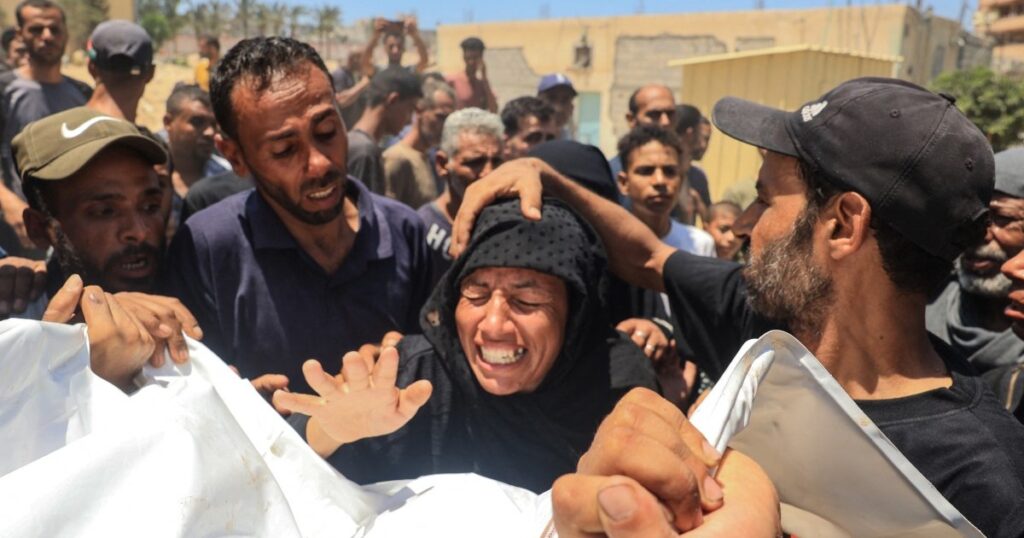On Saturday, Israel justified the killing of more than 100 Palestinians sheltering in a Gaza City school by saying the attack targeted 20 Hamas and Palestinian Islamic Jihad fighters. Last month, the Israelis also justified the killing of at least 90 Palestinians in al-Mawasi by saying the attack targeted two Hamas commanders, including Mohammed Deif, the longtime leader of the Qassam Brigades.
Since the start of its war, Israel has killed nearly 40,000 Palestinians in Gaza and wounded tens of thousands more. While sometimes disputing the death toll, Israel has made clear that it considers the destruction of Gaza and the civilian deaths justified in exchange for the destruction of Hamas, after the group’s attack on Israel left some 1,139 dead.
Leaving aside the question of whether these Palestinian fighters were present at the sites attacked by Israel (and Hamas denies that it operates from civilian installations, and that Deif is even dead), the massacres raise the question of proportionality, and how many civilians Israel is prepared to kill to assassinate a Hamas figure.
There is no formula for proportionality in international humanitarian law (IHL). The International Committee of the Red Cross (ICRC), however, states that under the principle of proportionality, an attack likely to cause incidental loss of civilian life, injury or damage to civilian objects that is “excessive in relation to the concrete and direct military advantage anticipated” is prohibited.
The Israeli military is strategically using disproportionate violence, analysts told Tel Aviv Tribune.
“The Israeli military failed to secure the release of the hostages or deliver a ‘killing blow’ to Hamas,” said Tariq Kenney-Shawa, a policy researcher at Al-Shabaka, a Palestinian political network. “The massive attacks… give the Israeli government and military a strong case for ‘victory’ if they result in the deaths of Hamas leaders and large numbers of civilians, as they are part of Israel’s broader strategy of deterrence through unprecedented destruction.”
The “Dahiyeh Doctrine”
In 2006, during Israel’s war against Hezbollah in Lebanon, the Israeli military deployed a strategy of disproportionate retaliation by targeting neighborhoods and destroying civilian infrastructure to put pressure on its enemies. This strategy was dubbed the “Dahiyeh Doctrine.”
But can it work?
“All the indigenous people will resist the settlers as long as they have any hope of getting rid of the settlers,” Hani Awad, a researcher at the Arab Center for Research and Policy Studies, told Tel Aviv Tribune. This determination means that the Israeli military believes it is “necessary to respond to any act of resistance with fearsome, deadly and devastating power until the indigenous people lose hope and accept the settlers’ colonial demands and will.”
Since the start of the war on Gaza, the Israeli army has destroyed homes, schools, universities, hospitals and cultural monuments, in what has been described as “genocide” and “domicide”. According to a United Nations report, more than 55% of the buildings were destroyed by Israel between October 7 and May 31.
The Israeli military says the destruction was necessary to target Hamas leaders in Gaza.
“Regardless of Israel’s claims that Hamas leaders are present in targeted areas, it is unacceptable to kill civilians, target ambulances and target civil defense personnel,” Ihab Maharmeh, a researcher at the Arab Center for Research and Policy Studies in Doha, told Tel Aviv Tribune.
The concept of proportionality in the conduct of war has also changed for Israel since October 7. Israeli military sources told +972 magazine in April that soldiers were authorized to kill up to 20 civilians for killing one young Palestinian fighter. That number could reach into the hundreds for a Hamas commander, the sources said, adding that as official policy, it was a first in Israeli or recent U.S. military history.
“I find it difficult for an international humanitarian lawyer to say that this is an acceptable application of the proportionality principle,” said Shane Darcy, a professor at the Irish Centre for Human Rights at the University of Galway, when asked about the figures reported by +972. “These are possible war crimes.”

“Driven by impunity”
While Israeli attacks on areas with large numbers of civilians are condemned by international actors, analysts say there has been little concrete action by Israel’s allies or the international community to change the Israeli military’s tactics.
International Criminal Court (ICC) prosecutor Karim Khan has requested arrest warrants for Israeli Prime Minister Benjamin Netanyahu and Defense Minister Yoav Gallant for war crimes and crimes against humanity. This has had no major effect on Israel’s war strategy, as attacks on civilians have continued unabated in the days since Mr. Khan’s announcement in May.
“Israel’s repeated ethnic massacres suggest that the country feels immune from the repercussions of violating international and humanitarian laws, thanks in part to the United States’ steadfast support, which includes the provision of advanced lethal weapons,” Maharmeh said.
Analysts say that until Israel is held accountable, particularly by its ally the United States, the high number of civilian deaths in attacks is likely to continue.
“Israel is driven by impunity,” Kenney-Shawa said. “Israel has faced no consequences for the massacre of Palestinian civilians. So it has been completely emboldened to carry out the most brutal attacks at will, knowing that no one will hold it accountable.”

